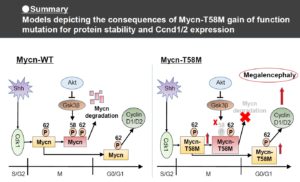We identified a heterozygous missense mutation (c.173C>T; p.Thr58Met) in the MYCN gene in an individual with megalencephaly, ventriculomegaly, hypoplastic corpus callosum, intellectual disability, polydactyly and neuroblastoma. The mutation occurred at Thr58 phosphorylation site essential for ubiquitination and subsequent MYCN degradation. In vitro and in vivo analysis suggested that this mutation stabilized and accumulated MYCN protein and induced prolonged CCND1 and CCND2 expression, which promoted neurogenesis and impaired neuronal cell migration. This is the first report of a germline gain-of-function mutation in MYCN leading to a novel megalencephaly syndrome contrary to Feingold microcephaly syndrome caused by a loss-of-function mutation in MYCN. (By Dr. Kohji Kato, https://jmg.bmj.com/content/early/2018/12/20/jmedgenet-2018-105487 )
MYCN de novo gain-of-function mutation in a patient with a novel megalencephaly syndrome
(Visited 1,070 times, 1 visits today)
